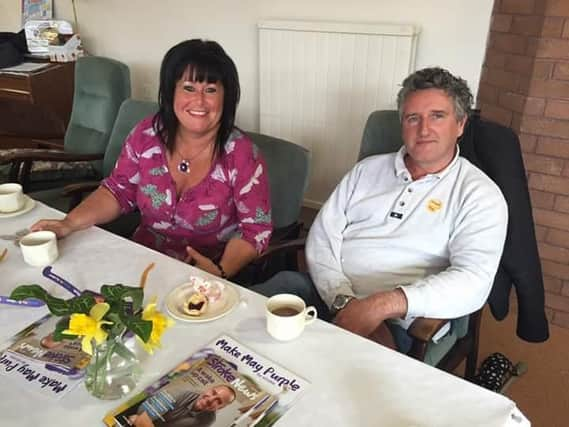Eamon is living proof that there can be recovery from a stroke, even years later


Eamon Flanagan, who had a stroke when he was only 46 attends the Derry Support Group where he has learnt alternative communication techniques.
His wife Maria explains how the stroke has affected him and how he has learnt to communicate successfully.
Advertisement
Hide AdAdvertisement
Hide AdDerry resident Eamon Flanagan is on the road to recovery after a stroke left him unable to communicate in 2011.
He is backing a new campaign by the Stroke Association to raise awareness of aphasia - a communication disability – and share tips for communicating with stroke survivors.
The Ask.Wait.Listen campaign encourages people in customer facing roles such as shop keepers, taxi drivers and waiters to understand the impact of aphasia.
Eamon had a major stroke on September 15th 2011 when he was 46 years old. A few days before his stroke, he complained about a sore neck and headache. These symptoms were initially put down to a pulled muscle or stress from work. However, after his wife noticed FAST symptoms one night while they were watching TV she immediately rang an ambulance. Doctors shortly confirmed he had had a stroke.
Advertisement
Hide AdAdvertisement
Hide AdDespite his stroke however, Eamon has been determined to find new ways to communicate again.
Maria Flanagan, Eamon’s wife said: “It was difficult at home in the beginning. Eamon was always very tired and couldn’t concentrate for long at a task.
“Just before we left the hospital, we had a visit from Liam Quigley from the Stroke Association. I had never had any dealings with them before so didn’t really know what they did. Liam was amazing. He suggested different techniques to communicate, to aid telling the time and feelings.
“We showed Eamon pictures and he was able to point to certain things so we had a better understanding of what he meant. It was so helpful and informative. I now knew there as somewhere and someone we could turn to for support.
Advertisement
Hide AdAdvertisement
Hide Ad“Liam explained that Eamon was welcome to join a speech group which took place every Tuesday for 2 hours and it would help with Eamonn’s confidence as well.”
Eamon is one of more than 350,000 people in the UK with aphasia, a communication disability which can affect people’s ability to speak, read, write, use numbers and understand but not their intelligence. Aphasia is caused by stroke, head injury or other neurological conditions.
Maria continues: “Eamon continues to improve nearly 5 years after suffering a stroke. Physically and mentally he has come a long way. I have no doubt he will continue to improve with time. He always tries his best to communicate what he wants to say even to strangers. There is hope of great recovery even years after suffering a stroke and Eamon is living proof of that.”
Barry Macaulay, NI Director at the Stroke Association comments,
Advertisement
Hide AdAdvertisement
Hide Ad“Having aphasia can be so frustrating because many stroke survivors know what to say, but are unable to make themselves understood. Seemingly ordinary tasks like buying a pint of milk or using money can feel very stressful, and it is easy to lose confidence. Many people with aphasia can feel very isolated as a result.
“If people working in shops, cafes, banks and a huge variety of other customer service roles know about the disability and follow a few of our simple tips, the barriers to communication can be start to be broken down.
The Stroke Association is raising awareness of aphasia and how people in the community can help support stroke survivors affected by the condition. To support this campaign, you can go to stroke.org.uk/aphasia or search for #aphasia on social media.
To find out more about local stroke services in Derry contact Liam Quigley on [email protected] or contact 079 4727 3620